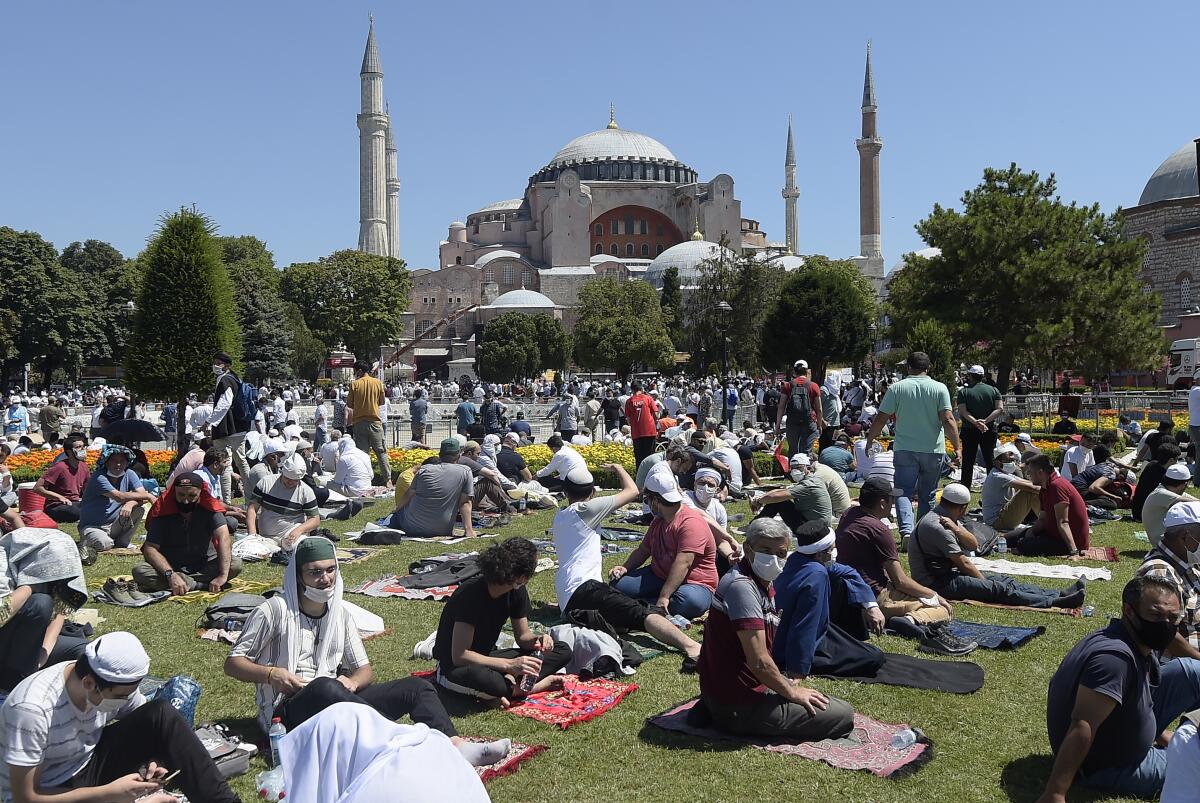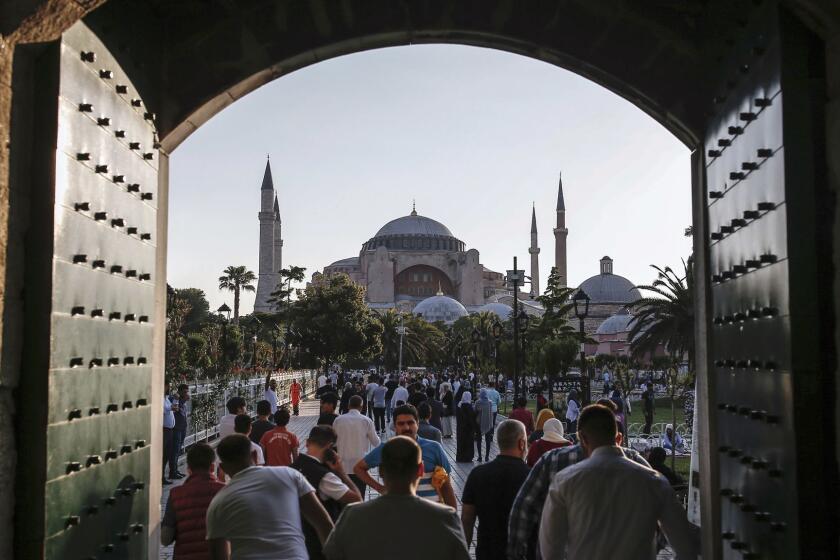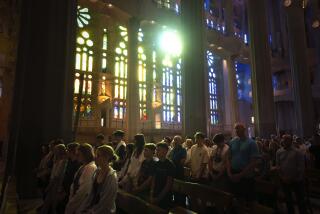To joy and dismay, Istanbul’s Hagia Sophia opens for Muslim prayers for first time in 86 years

- Share via
ISTANBUL, Turkey — Fulfilling a dream of his Islamic-oriented youth, Turkish President Recep Tayyip Erdogan joined hundreds of worshipers Friday for the first state-sanctioned Muslim prayers in 86 years inside Hagia Sophia, the Istanbul landmark that served as one of Christendom’s most significant cathedrals, a mosque and a museum before its conversion back into a Muslim place of worship.
Thousands of other Muslim faithful came from across Turkey and quickly filled specially designated areas outside the Byzantine-era monument to join in the inaugural prayers. Many others were turned away.
Orthodox Christian church leaders in Greece and the U.S. announced a “day of mourning” over Hagia Sophia’s return to being a mosque.
Friday’s prayers began with Erdogan reciting from the Quran. The head of Turkey’s religious authority, Ali Erbas, led the ceremony and prayed that Muslims would never again be “denied” the right to worship at the internationally celebrated 6th century structure.
As many as 350,000 people took part in Friday’s prayers, Erdogan said.
Brushing aside international criticism, Erdogan issued a decree restoring the iconic building as a mosque earlier this month, shortly after a Turkish high court ruled that Hagia Sophia had been illegally made into a museum more than eight decades ago. The structure, listed as a UNESCO World Heritage site, has since been renamed “The Grand Hagia Sophia Mosque.”
In its more than 1,400-year existence, the majestic Hagia Sophia in Istanbul has served as a cathedral, a mosque and a museum.
The move sparked dismay in Greece, the United States and among Christian churches who had called on Erdogan to maintain it as a museum in recognition of Istanbul’s multi-religious heritage and the structure’s status as a symbol of Christian and Muslim unity. Pope Francis expressed his sadness.
Built by the Byzantine Emperor Justinian in A.D. 537, Hagia Sophia was turned into a mosque with the 1453 Ottoman conquest of Istanbul. But Mustafa Kemal Ataturk, the founding leader of the secular Turkish republic, converted the structure into a museum in 1934.
Although an annex to Hagia Sophia, the Sultan’s pavilion, has been open for Muslim prayers since the 1990s, religious and nationalist groups in Turkey have long yearned for the nearly 1,500-year-old edifice, which they regard as the legacy of Ottoman Sultan Mehmet the Conquerer, to reverted to serving as a mosque.
“This is Hagia Sophia breaking away from its captivity chains. It was the greatest dream of our youth,” Erdogan said last week. “It was the yearning of our people, and it has been accomplished.”
Five times a day, the loudspeakers affixed to the spires of some 90,000 state-run mosques crackle to life, and the Islamic call to prayer bathes the streets of Istanbul and other Turkish cities.
Erdogan described its conversion into a museum by the Turkish republic’s founding leaders as a mistake that was being rectified.
In neighboring Greece, bells tolled and flags flew at half staff at hundreds of churches across the country in protest. The Greek Orthodox Church leader, Archbishiop Ieronymos, will hold a special service at Athens Cathedral later Friday. Churches in Athens and Greece’s second-largest city, Thessaloniki, are also organizing vigils.
“Today is a difficult day. ... A shadow hangs over us with the transformation of Hagia Sophia into a mosque, something that genuinely shocks Christians all over the world and not only Greeks,” Greek government spokesman Stelios Petsas said in an interview with private channel Open TV. “We have warned for some time that this will create an unbridgeable gap between Turkey and the Christian world.”
The history and religious traditions of the predominantly Greek-speaking and Orthodox Christian Byzantine Empire remain influential in Greece. The protests over Hagia Sophia also occur amid a volatile dispute between Greece and Turkey over mineral rights in the eastern Mediterranean, with the Greek military on alert over a planned Turkish maritime survey in waters claimed by Greece.
Breaking News
Get breaking news, investigations, analysis and more signature journalism from the Los Angeles Times in your inbox.
You may occasionally receive promotional content from the Los Angeles Times.
In New York, the Greek Orthodox Archdiocese of America called the inaugural prayers at Hagia Sophia a “cultural and spiritual misappropriation and a violation of all standards of religious harmony and mutual respect.” Archbishop Elpidophoros of America held a meeting with President Trump and Vice President Mike Pence in Washington on Thursday to discuss concerns over the re-conversion.
Turkey has vowed to protect Hagia Sophia’s artifacts and has said it will remain open to visits by Muslims and non-Muslims outside of prayer hours. The structure’s mosaics depicting Christian figures are being covered with sail-like white drapes during the prayers.
More to Read
Sign up for Essential California
The most important California stories and recommendations in your inbox every morning.
You may occasionally receive promotional content from the Los Angeles Times.














